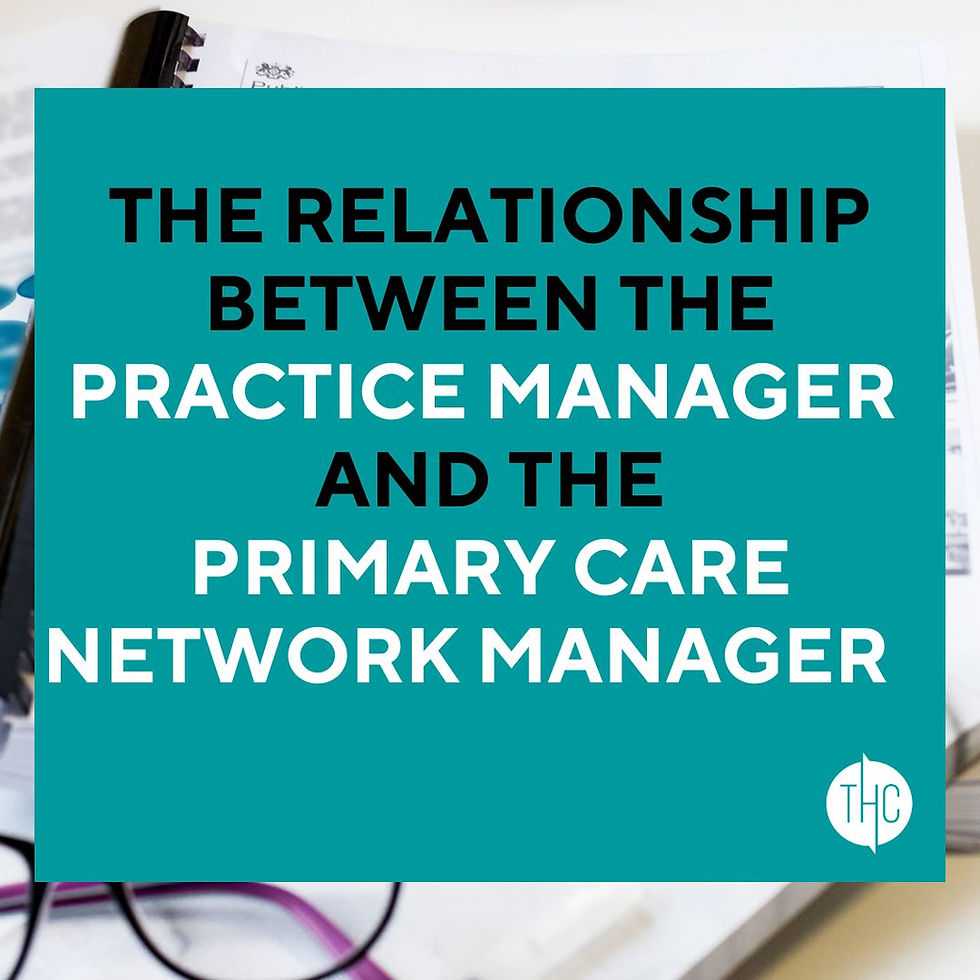The Unintended Consequence of Devolving your Primary Care Network Budget
- May 17, 2023
- 3 min read
Updated: Jul 2, 2024
At THC Primary Care, we provide resources for Primary Care Network leaders.
Part of our mission is to promote best practice and share our own lessons learned via the medium of our blog posts, which are a mixture of thought pieces, commentary, reflections, policy analysis and high-level summaries.
Based on my own experiences and conversations with networks across the country, in this blog, we will be covering 9 unintended consequences of devolving your primary care network budgets.
Let's jump in!

We are all accustomed to the end-of-year financial dash to spend the remaining Additional Role Reimbursement Scheme (ARRS) monies, because we know that if we don’t use it, we lose it.
To date, this mad rush commonly manifests as follows:
1️⃣ Paying providers in advance
2️⃣ Bulk commissioning of a temporary workforce solution
3️⃣ Trying to recruit to permanent or fixed-term positions without a clear plan
4️⃣ Devolving the ARRS budget across practices
Networks that typically manage their resources at a network level but then decide to devolve their budget do so with the best of intentions to;
1️⃣ Give their practices both flexibility and greater control of how to utilise the
workforce.
2️⃣ Maximise the funding opportunities available
Or this happens quite frankly, irrespective of the end-of-year dash, with networks devolving their budgets per list size because the network does not really want to work together.
Devolution
Devolution of finances, particularly that of the ARRS funding, can introduce a level of risk and some unanticipated and unwelcome consequences, such as:
💢 Variation in how roles are used
💢 Different employment terms and conditions which, in turn, lead to issues with recruitment and retention, and increased competition, between practices
💢 Fragmentation of how induction, training, support and supervision are conducted from practice to practice
💢 A lack of financial governance
💢 An introduction of silo working
💢 Fractional appointments which are hard to recruit to for practices with a small list size
💢 A risk that DES requirements will not be met
💢 It's hard to rewind the decision once it's been made
💢 A loss of network identity and purpose
All of this results in conflict.
Now…… this does not apply to every PCN. Many have managed the devolution really well and have extended this beyond the Additional Role Reimbursement Scheme, devolving other income streams (based on list size) back to practices.Things to consider
Before you make the leap into apportioning out your budget, you may want to consider the following:
✅ Ensure there is a Memorandum of Understanding in place between practice/s and PCN
✅ Review your network agreement and ensure that any areas of the DES which are subcontracted to specific practices is clearly documented and agreed
✅ Make certain that PCN employment terms and conditions are formally agreed at network level
✅ Create consistent job descriptions and work plans
✅ Create a suite of common standards when it comes to induction
✅ You must be crystal clear on the reimbursement rate
✅ Confirm and agree on the allocation (and achievement) of the investment and impact indicators - and how this relates to individual practice performance
✅ Document and address any 'live' governance issues or gaps to ensure you can remain true to your network vision.
In short, allocate time to review your current governance arrangements, and the principles you are working to, to ensure there is consistency and clarity across the board.
In conclusion...
Clarity is key.
Everyone needs to know where they stand because a lack of clarity leads to confusion, which ultimately results in....conflict.
Devolution can work, but think carefully about the vision for your network, as one huge unintended consequence of devolving your Primary Care Network budget could be.....the undoing of working collaboratively and working at scale.
We hope this provides some food for thought.
Never miss a blog again.

Sign up for our FREE newsletter to ensure you never miss a blog, webinar, course or resource again.
We promise not to spam you!
About the Author

I'm Tara; I am the founder of THC Primary Care, an award-winning healthcare consultancy specialising in Primary Care Network Management and the host of the Business of Healthcare Podcast, where we have now published over 300 episodes.
I have over 20 years of project management and business development experience across the private and public sectors.
I have managed teams across multiple sites and countries; I have an MBA in Leadership and Management in Healthcare, I'm published in the London Journal of Primary Care, and I am the author of over 250 blogs.
I have 3 children. My eldest has Asthma, my middle child has a kidney condition called Nephrotic Syndrome, and my youngest daughter has Type 1 Diabetes, so outside of work, healthcare plays a huge role in my life.





.png)

.png)

